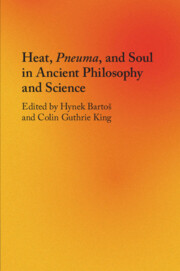Book contents
- Heat, Pneuma, and Soul in Ancient Philosophy and Science
- Heat, Pneuma, and Soul in Ancient Philosophy and Science
- Copyright page
- Contents
- Contributors
- Preface
- Introduction
- I Early Greek Philosophy and Medicine
- II Aristotle
- Chapter 7 Heat, Meteorology, and Spontaneous Generation
- Chapter 8 Aristotle on the Nature in the Pneuma and the First Body
- Chapter 9 Aristotle on the Powers of Thermic Equilibrium
- Chapter 10 Why Animals Must Keep Their Cool: Aristotle on the Need for Respiration (and Other Forms of Cooling)
- Chapter 11 Soul’s Tools
- Chapter 12 When Life Imitates Art: Vital Locomotion and Aristotle’s Craft Analogy
- Chapter 13 Blood, Pneuma, or Something More Solid? Aristotle on the Material Structure of Perceptual Apparatus
- Chapter 14 The Pathological Role of Pneuma in Aristotle
- Bibliography
- Index Locorum
- Index
Chapter 12 - When Life Imitates Art: Vital Locomotion and Aristotle’s Craft Analogy
from II - Aristotle
Published online by Cambridge University Press: 20 February 2020
- Heat, Pneuma, and Soul in Ancient Philosophy and Science
- Heat, Pneuma, and Soul in Ancient Philosophy and Science
- Copyright page
- Contents
- Contributors
- Preface
- Introduction
- I Early Greek Philosophy and Medicine
- II Aristotle
- Chapter 7 Heat, Meteorology, and Spontaneous Generation
- Chapter 8 Aristotle on the Nature in the Pneuma and the First Body
- Chapter 9 Aristotle on the Powers of Thermic Equilibrium
- Chapter 10 Why Animals Must Keep Their Cool: Aristotle on the Need for Respiration (and Other Forms of Cooling)
- Chapter 11 Soul’s Tools
- Chapter 12 When Life Imitates Art: Vital Locomotion and Aristotle’s Craft Analogy
- Chapter 13 Blood, Pneuma, or Something More Solid? Aristotle on the Material Structure of Perceptual Apparatus
- Chapter 14 The Pathological Role of Pneuma in Aristotle
- Bibliography
- Index Locorum
- Index
Summary
Fernandez and Mittelmann focus on Aristotle’s analogy between the soul as an efficient cause and a craft. They argue that the acts of a craft are a special kind of vital act of a rational soul and that the continuous unifying activity of the source of motion in those cases, which must be constantly and not episodically at work in and throughout each of its acts, is not an idiosyncratic feature of the rational case, but the rational version of a form of efficient causality that is at work in all those vital phenomena of which the soul is said to be the efficient cause.
- Type
- Chapter
- Information
- Heat, Pneuma, and Soul in Ancient Philosophy and Science , pp. 260 - 287Publisher: Cambridge University PressPrint publication year: 2020

